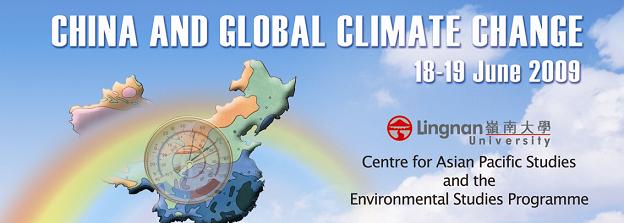
Event Title
Conference on China and Global Climate Change : Reconciling International Fairness and Protection of the Atmospheric Commons
Location
AM308, Lingnan University
Start Date
19-6-2009 2:00 PM
End Date
19-6-2009 3:30 PM
Language
English
Description
China is facing increasing environmental pressure, among which climate change is the most serious one. As many areas are still under development, the country’s vulnerability to the adverse impacts of climate change lies not only in its ecological aspect but also its social aspect. In particular, the country’s increasing energy demand has posed serious problem, as the country strongly relies on fossil-fuels. Dilemmas exist between development and increasing level of pollution. Local government, to realize its political credibility often permits environmental pollution happen and has been ineffective in local environmental governance.
Chinese environmental non-governmental organizations (ENGO), led by journalists, scientists and key environmentalists, have emerged since early 1990s. They begin to play an increasingly significant role in China’s dealing climate change. Although still in its early stage of development, domestic ENGOs are greatly influenced by International ENGOs in their strategies, organizational development and accessing scientific knowledge. Chinese ENGOs have become successful in assisting local communities dealing with key issues of climate change, including energy, agriculture pattern and changes of lifestyles in cosmopolitans.
Illustrated by case studies, this paper discusses the role that Chinese environmentalists play in local communities’ dealing with climate change issues. It examines ENGOs’ the characteristics, strategies, knowledge and technology transfer in their organizational development and promotion of social changes. In particular, this paper explores the interaction between ENGOs, INGOs, local governments and local communities in looking for solutions of climate change.
This paper contributes to the understanding of China’s growing civil society and local practices in mitigating climate change’s impact, which have significant influence to local and national environmental governance. It also deepens our understanding of the impact of globalization to the country.
Document Type
Presentation
Recommended Citation
Xie, L. (2009). Public initiatives and local practices in China’s response to climate change. In China and global climate change: Proceedings of the conference held at Lingnan University, Hong Kong, 18-19 June 2009 (pp. 545-559). Centre for Asian Pacific Studies and the Environmental Studies Programme, Lingnan University, Hong Kong.
Included in
Public initiatives and local practices in China’s response to climate change
AM308, Lingnan University
China is facing increasing environmental pressure, among which climate change is the most serious one. As many areas are still under development, the country’s vulnerability to the adverse impacts of climate change lies not only in its ecological aspect but also its social aspect. In particular, the country’s increasing energy demand has posed serious problem, as the country strongly relies on fossil-fuels. Dilemmas exist between development and increasing level of pollution. Local government, to realize its political credibility often permits environmental pollution happen and has been ineffective in local environmental governance.
Chinese environmental non-governmental organizations (ENGO), led by journalists, scientists and key environmentalists, have emerged since early 1990s. They begin to play an increasingly significant role in China’s dealing climate change. Although still in its early stage of development, domestic ENGOs are greatly influenced by International ENGOs in their strategies, organizational development and accessing scientific knowledge. Chinese ENGOs have become successful in assisting local communities dealing with key issues of climate change, including energy, agriculture pattern and changes of lifestyles in cosmopolitans.
Illustrated by case studies, this paper discusses the role that Chinese environmentalists play in local communities’ dealing with climate change issues. It examines ENGOs’ the characteristics, strategies, knowledge and technology transfer in their organizational development and promotion of social changes. In particular, this paper explores the interaction between ENGOs, INGOs, local governments and local communities in looking for solutions of climate change.
This paper contributes to the understanding of China’s growing civil society and local practices in mitigating climate change’s impact, which have significant influence to local and national environmental governance. It also deepens our understanding of the impact of globalization to the country.

